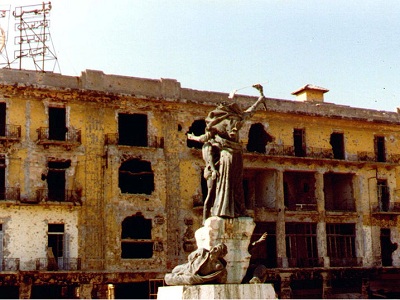
By Jamal Kanj
Lebanon commemorated the 38th anniversary of its Civil War last week. In the days leading up to April 13, 1975 the country was virtually divided across sectarian lines.
The military presence of the Palestine Liberation Organization and its perceived alliance with the Lebanese left and Muslims against the right wing, predominantly Maronite Christians, only complicated the division.
Today, Lebanon is not much wiser and no less divided. The conflict in neighboring Syria, between President Bashar Al Assad and the armed opposition, is reverberating on every street corner in the country.
Last week I joined a childhood friend at a coffee shop in Beirut. I was unaware at the time, but even agreeing on a meeting place had its political nuances. He suggested Zawaya Cafe on Hamra Street.
In addition to catching up, we talked about the history of Al Hamra district and I lamented how its coffee shops were known as late night dens for prominent local and mostly exiled Arab intellectuals.
My acquaintance, an astute author with profound insight into Lebanese politics, explained that Al Hamra was now developing an exclusive identity between two rival camps.
He said that supporters of the March 14 anti-Assad coalition frequented shops in Beirut’s center, while pro-Assad sympathizers patronized businesses in the southern suburbs. Al Hamra is home for those not associated with either bloc.
The coffee shop rift represents the civilized facet of Lebanon’s political diversity, for the simmering tension is threatening public peace in the country’s three major cities: Beirut, Tripoli and Sidon.
In Beirut, each neighborhood is guarded at night by vigilante groups stopping suspected interlopers and scrutinizing their identification cards. Some are held or assaulted for being in the wrong place at the wrong time. It was not unusual to see army personnel carriers at street corners, demarking unofficial boundaries that divide neighborhoods along sectarian and political lines.
In Tripoli, we passed by a Sunni anti-Assad suburb bordering an Alawite pro-Assad neighbourhood. The two heavily armed sides make the city the most likely urban flashpoint for any potential spillover of the Syrian conflict. Driving on the major highway we noticed a large number of gunmen gathering on both sides of the road. Arriving at our destination half an hour later, we came to know that a fight broke out leaving one person dead and several wounded.
In the third major city of Sidon, an anti-Assad religious clerk holds the city hostage with his rancorous and divisive speeches. Against this backdrop, Lebanese Prime Minister Najeeb Mikati tendered his resignation last month.
His government had unexpectedly survived two years with a thin majority coalition of antagonistic politicians. The March 8 Alliance-dominated government overcame its first hurdle in 2011, a disagreement over financing the Special Tribunal for Lebanon investigating the murder of former Prime Minister Rafik Hariri and other political assassinations.
But it crumbled late last month when ministers failed to agree on extending the term in office of the Director General of the Internal Security Forces.
On April 6, the Lebanese parliament overwhelmingly nominated Tamam Salam to become the designate Prime Minister.
The main task for the new government – if it ever materializes – will be to reach a consensus on new electoral law and to oversee the next parliamentary election, originally scheduled for next June – an election where voters are well disposed to choose candidates based on their parochial proclivity, not collective national will.
The invariable result will be the formation of yet another paralyzed misnomer unity government. It is another “democratic” exercise to perpetuate the national divide and bring little relief to fix the ills of Lebanon’s confessional (sectarian) democracy.
– Jamal Kanj (www.jamalkanj.com) writes weekly newspaper column and publishes on several websites on Arab world issues. He is the author of “Children of Catastrophe,” Journey from a Palestinian Refugee Camp to America. He contributed this article to PalestineChronicle.com. (A version of this article was first published by the Gulf Daily News newspaper.)




